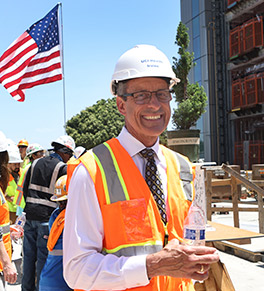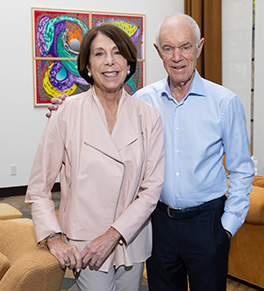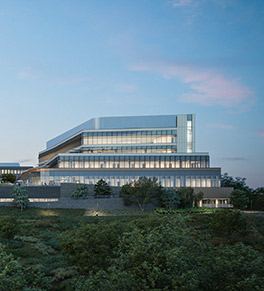
Brain Tumor Surgery
We understand your concern about brain tumor surgery. Our doctors have deep expertise from performing hundreds of brain tumor surgeries every year.
Our approach to brain tumor surgery
The discovery of a brain tumor is challenging. When it’s time to discuss treatments, our neurosurgeons will expedite your appointment and thoroughly explain your condition in layman’s terms. We review your imaging scans together, guide you through your treatment options and help you know what to expect.
Our care is patient centered—we approach our consultation as if we were speaking with a family member. Patient-centered care also includes our weekly UCI Health tumor board meetings. Multiple specialists strategize about your case and come to a consensus about the best possible treatment for you.
We’re in regular communication with you about every aspect of your care from our neurology, oncology and radiology specialists. We perform traditional surgeries and where possible, offer minimally invasive surgical techniques. For you, that means less pain, faster recovery and a shorter hospital stay.
How to work with us
There are a few ways you may find yourself partnering with us in the UCI Health Neurosurgery Program.
If you experience sudden, debilitating headaches, blurry vision or unexpected cognitive difficulties like confusion, go to the emergency room. There, you will get a brain imaging scan. If there’s a suspicious lesion, you could be referred to us.
You may have no symptoms but have an accident and an MRI reveals a tumor. If you have a cancer diagnosis elsewhere in your body, you already have a medical oncologist. Your doctor may refer you to us for treatment if the cancer has metastasized to your brain.
How long does it take to recover from a brain tumor removal?
If your overall health is good before surgery, you’ll need less time to recover afterwards. The type of tumor you have affects recovery time and any aftercare you may need.
Usually, patients stay in the hospital from three to 10 days.
Your at-home recovery period could last from six weeks to three months. It takes about three months to recover your energy levels and return to work. Each case is different and your recovery could take longer.
How many hours does brain tumor surgery take?
Brain tumor surgery can take from three to seven hours.
The most common type of brain tumor surgery is a craniotomy. A typical craniotomy can take from three to five hours. Transsphenoidal surgery, which is performed through the nose, generally takes three to four hours.
Depending on its complexity, the operation could take six hours or more.
Can you live a full life after brain tumor surgery?
Yes, it is possible to live a full life after brain tumor surgery.
The answer will of course depend on your unique case. Your tumor’s type, grade, size and location affect different parts of your brain. This in turn can impact your mobility, strength, memory, or speech.
After surgery, we monitor you around the clock while you’re in the hospital. Then we offer thorough aftercare.
How serious is brain tumor surgery?
Brain tumor surgery is a serious operation. Open surgery such as a craniotomy carries risks of infection, bleeding or blood clots.
Potential side effects also depend on where the tumor is located. For instance, if a tumor is near your optic nerve, your vision might be affected.
While still serious, minimally invasive techniques reduce the risk of infection and allow for a faster recovery. Your surgeon will also put all potential risks into perspective so you understand what is more or less likely to occur.
What is the most difficult brain tumor to remove?
Glioblastomas can be difficult to remove. They are the most aggressive form of brain tumor and grow rapidly. We usually treat glioblastoma with a combination of surgery, radiation and targeted therapy.

Trust in our cross-disciplinary expertise
Your care starts at our first consultation. Our collective specialties, grasp of leading-edge technology, and robust patient support will ensure your surgery is a success.
Call us at 714-456-8000 today to make an appointment.
We welcome referrals from community physicians.
To refer a patient to our program, call 714-456-8000 or fill out an online request form. You may also email us at www.ucihealth.org/medical-services/brain-tumor-program/email-us.
One of our brain tumor physicians will return your call within 24 hours. We can see your patient in our offices within 48 hours after insurance approval.
Benefits of brain tumor surgery
Surgery is your first and best line of defense to recover from a brain tumor.
Our neurosurgery program continues to be at the leading-edge of brain tumor care as we stay current with new techniques. We’re very experienced at traditional open surgery, called a craniotomy. Wherever possible, your neurosurgeon will treat you with minimally invasive tools.
Less invasive procedures reduce:
- Your stay in the hospital
- Recovery time
- Risk of infection
Specialized brain tumor surgeries
- Skull base surgery
Your skull base is an anatomically complicated area that requires a multidisciplinary team. If your tumor is located at the bottom of your brain, our specially trained skull base surgeons provide safe, effective treatment. We use minimally invasive techniques for this complex operation. - Endoscopic endonasal surgery
We insert long thin tubes with a light and camera at the end through your nose.
That allows us to access tumors in the front of your brain without any facial incisions. This nearly eliminates the risk of cosmetic problems after surgery. - Keyhole craniotomy
Your neurosurgeon will place sophisticated tools and imaging devices through a dime-sized hole in your skull to perform surgery.
There’s less pain, scarring and a faster recovery compared to a traditional craniotomy. - Pinhole craniotomy
Your neurosurgeon makes an even smaller incision than in a keyhole craniotomy.
We use this technique alongside the ROSA™ robotic neurosurgery device to access and remove the most difficult tumors.
Neurosurgery technologies
- BodyTom® captures real-time 3D images of the brain during surgery
This first-of-its-kind CT scanner gives your neurosurgeon great accuracy while operating near areas that control breathing and swallowing. - BrainPath® allows us to carefully remove tumors deep within the brain without disrupting nearby tissue
We are among the first programs in Southern California to use this advanced device. - ROSA™ robotic device - we are one of only a dozen hospitals nationwide using the ROSA™ device
Your neurosurgeon gently guides this robotic technology to successfully handle complex surgery. - Visualase® thermal laser ablation destroys brain tumors using heat from a special laser light (infrared)
We monitor the tumor and surrounding tissue using real-time imaging. This reduces your risk of complications.
What to expect
If you’re dealing with a brain tumor diagnosis, expect quick action.
We’re here to stop tumor growth as quickly as possible. Moving forward may happen at a faster pace than you expect.
We also take in the full picture of who you are and what you’re coping with psychologically and emotionally. This factors into our recommendations and we’ll coach you through any needed adjustments.
We welcome and include your family members at our consultation appointments.
We’ll educate you together in a comprehensive discussion so you understand all the treatment’s pros, cons and benefits. Our doctors will explain surgical and other procedures visually and procedurally. You can weigh your treatment decision with family and friends and anticipate the support you’ll need during recovery.
While we may strongly recommend one treatment over another, the decision is yours. We advise patients the same way we’d guide a loved one.
We’ve seen a lot during the hundreds of yearly surgeries we’ve performed. Ask us anything.
One of our experts will find an answer that gets you relief. We will help you navigate and understand every step before moving forward.
Surgery is often the first, gold standard treatment.
Even if a tumor is only partially accessible through surgery, we may operate first. Then we may add complementary treatments such as radiation and/or targeted therapy. Stereotactic radiosurgery is a minimally invasive way to radiate brain tumors with pinpoint accuracy and is an excellent complement to surgery.
What happens after my brain tumor surgery?
After your brain tumor surgery, we closely monitor your vital signs, give you pain medications and test your neurologic function. We look for and treat infections, pressure or any other complications. If you need the help of a physical, occupational or speech therapist, we’ll make sure you get it.
We have a pet therapy program at UCI Health and encourage your loved ones to bring your pet in for a visit. Our doctors find that pet visits lift your mood and speed your recovery.
Your doctor will discuss with you what your next steps after surgery are, including when next to come in for brain imaging.
We’ll coordinate your discharge
If we feel it would help you, you can meet with one of our social workers. They can help arrange support for your at-home recovery period. Or they may recommend that you temporarily recover in a skilled nursing facility.
If you have a strong support system or family living at home, we’ll recommend you go home when you leave the hospital.
Why choose UCI Health for brain tumor surgery?
Our multidisciplinary approach means you benefit from our collective clinical wisdom.
At UCI Health, our tumor board meets weekly to discuss your surgery. No one doctor makes a unilateral decision about your care. We confer with our colleagues across disciplines: neurosurgery, neuro oncology, radiation oncology, medical oncology and other specialties as needed.
We consider every aspect of your condition and combine multiple specialists’ expertise to create the best treatment plan for you. We specialize in treating rare tumors and also use this method to handle the most complex cases.
Benefit from the results of our research and clinical trials.
Our neurosurgeons and brain tumor experts have developed and furthered innovative medical research at a national level.
For example, immunotherapy for meningioma is rare. We have conducted immunotherapy clinical trials for both glioblastoma and meningioma patients. If you qualify and an appropriate clinical trial is available, you may get access to novel treatments before they are widely available.
Intensive post-surgery and follow-up care is available.
Our Neuro ICU (Neuroscience Intensive Care Unit) is a 12-bed, highly specialized unit. If you’re critically ill with a brain disorder, you’ll receive state-of-the-art medical and surgical management and 24/7 monitoring.
Our neuro ICU is run by board-certified neurologists with additional fellowship training in neurological intensive care. You’re in excellent hands.
Expect comprehensive support services beyond surgery.
During your cancer journey, take advantage of the psychological, emotional and spiritual support available through our Cancer Support Services. Our social workers and certified chaplains will help alleviate both the practical, social and professional stressors that come up.
Once you are in your post-cancer recovery process, we encourage you to work with our Cancer Survivorship Services team. This program offers cancer screenings and helps you maintain balance with healthy lifestyle choices.
Featured Blog Posts

A 'dream come true' realized in Irvine
Dr. Michael J. Stamos once envisioned opening a small cancer center on the UC Irvine campus. What has emerged, he says, is so much more.

Devoted donors pay it forward

Reimagining cancer care for all of Orange County
When it opens July 16, the Chao Family Comprehensive Cancer Center’s newest location will offer superior care, comfort and convenience.




